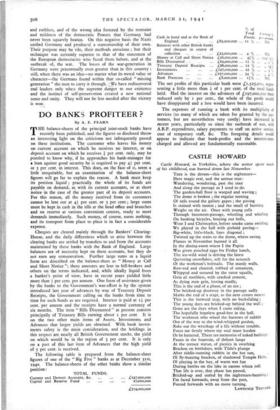DO BANKS PROFITEER ?
By A. E. PEARN
THE balance-sheets of the principal joint-stock banks have recently been published, and the figures so disclosed throw an interesting light on the criticisms not infrequently passed on these institutions. The customer who leaves his money on current account on which he receives no interest, or on deposit account on which he receives 2 per cent. only, may be puzzled to know why, if he approaches his bank-manager for a loan against good security he is required to pay 41 per cent. or 5 per cent. in interest. This does, on the face of it, seem a little inequitable, but an examination of the balance-sheet figures will go far to explain the reason. A bank must keep its position liquid ; practically the whole of its funds are payable on demand, as with its current accounts, or at short notice in the case of the greater part of its deposit accounts. For this reason, all the money received from its customers cannot be lent out at 4+ per cent. or 5 per cent.; large sums must be kept in cash in the tills at the head office and branches and on reserve at various convenient centres, ready to meet demands immediately. Such money, of course, earns nothing, and its transport from place to place is in fact a considerable expense.
Cheques are cleared mainly through the Bankers' Clearing- House, and the daily differences which so arise between the clearing banks are settled by transfers to and from the accounts maintained by these banks with the Bank of England. Large balances are of necessity kept on these accounts, but they do not earn any remuneration. Further large sums in a liquid form are described on the balance-sheet as " Money at Call and Short Notice "; these amounts are lent to bill-brokers and others on the terms indicated, and, while ideally liquid from a banker's point of view, have in recent years yielded little more than I per cent. per annum. One form of assistance given by the banks to the Government's war-effort is by the system introduced last year of advances by way of Treasury Deposit Receipts, the Government calling on the banks from time to time for such funds as are required. Interest is paid at I8 per cent. per annum and the receipts have a normal currency of six months. The item " Bills Discounted " at present consists principally of Treasury Bills earning about r per cent. It is on the two other main items of Assets, Investments and Advances that larger yields are obtained. With bank invest- ments safety is the main consideration, and the holdings in this respect are nearly all. British Government stocks, the yield on which would be in the region of 3 per cent. It is only on a part of this last item of Advances that the high yield of 5 per cent. is received.
The following table is prepared from the balance-sheet figures of one of the " Big Five " banks as at December 31st, 1940. The balance-sheeti of the other banks show a similar position:
TOTAL FUNDS.
Current and Deposit Accounts, &c.
Capital and Reserve Fund ... 27,000,000
£574,000,000
•• • £547,000,000
% of
Total Earning % Cash in hand and at the Bank of Funds. per annum. England ... ... ... £63,000,000 ... ix % ... NiL Balances with other British banks
and cheques in course of
collection ... ... ... £23,000,000 .. • 4 % •-. Nil. Money at Call and Short, Notice £26,000,000 ..• 41% •-• (say) I% Bills Discounted . . ... 02,000,000 ... i i % ... ,, 1 % Treasury Deposit Receipts L68,000,000 ... I2 % ... n ii % Investments ... ... k I 27,000,000 ... 22 % ... ,, 3 %
Advances ... Bank Premises ...
The net profits of this particular bank were £1,525,000, repre- senting a little more than < of r per cent. of the total funds held. Had the interest on the advances of k197,000,000 been reduced only by 1 per cent., the whole of the profit would have disappeared and a loss would have been incurred.
The expenses of rnnning a bank with its multiplicity of services (so many of which are taken for granted by the cus- tomers, but are nevertheless very costly) have increased in recent years, particularly so since the outbreak of war, with A.R.P. expenditure, salary payments to staff on active service, cost of temporary staff, &c. The foregoing details would appear to indicate that bank-profits and the interest-rates charged and allowed are fundamentally reasonable. ••• £/97;000;000 •-• 34 % ,, 4 % 0,000,000 '1% NiL






































 Previous page
Previous page